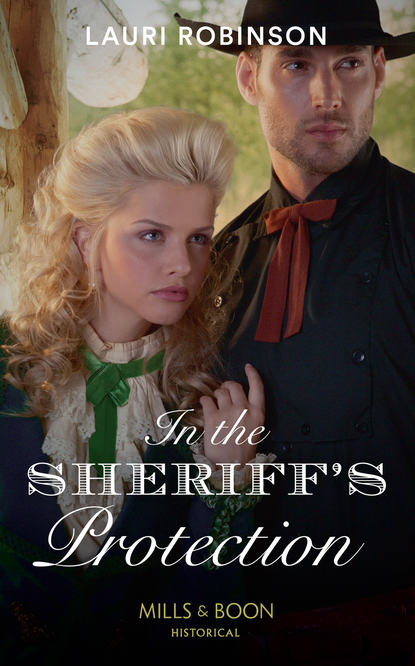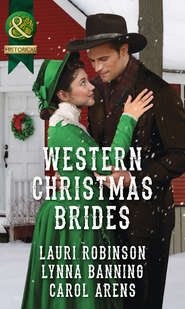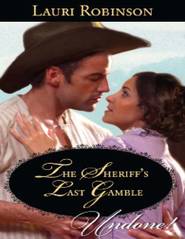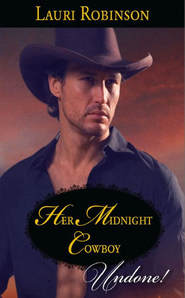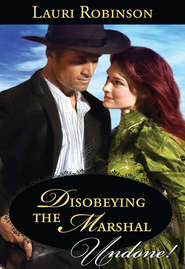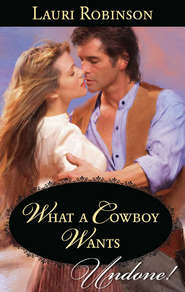По всем вопросам обращайтесь на: info@litportal.ru
(©) 2003-2025.
✖
In The Sheriff's Protection
Настройки чтения
Размер шрифта
Высота строк
Поля
She was do-si-do-ing, wondering if Billy had let it be known that his father was an outlaw. The boy hadn’t. Probably because he didn’t know. He thought his father was out buying or selling cattle. Billy said he wasn’t sure which because his father did both. Tom, on the other hand, figured it was all selling on Hugh’s part, and that if Hugh Wilson had a cow to sell, it was because he’d stolen it first.
He hadn’t questioned Billy about anything. Children shouldn’t be used as informants. He’d never done that before and wouldn’t now. Furthermore, he’d bet the reason Billy didn’t know was because Clara didn’t want him to know. She had to realize she couldn’t keep it a secret forever. Sooner or later, Billy would figure it out. Which wasn’t, or shouldn’t be, his concern.
“Things that are important to little boys,” he said. “Where Walter’s dog is buried. Where he found that old prairie gun of his. How he saw an Indian up on the ridge one time. Which chickens lay brown eggs, white eggs, and the occasional green one. How you make him take a bath and comb his hair whether he wants to or not.” There were a hundred other things Billy had mentioned, but her soft laughter was making him chuckle.
“Oh, dear, I must apologize. He does like to prattle on, and usually has no one but me to talk to.”
“No apologies necessary.” He enjoyed spending time with the boy and didn’t mind her knowing what he thought on that issue. “Billy’s a good boy. Smart and caring. You’ve done a fine job with him and he’ll do you proud.”
She stopped the chair from rocking and had four fingers of one hand lightly pressed to her lips. Her blond hair was still in the long braid as when he’d arrived, but she’d coiled it and pinned it to one side of her head, which was very becoming. So were her eyes. They were as blue as the sky had been earlier, and right now, shimmered in the evening light.
“Thank you, Mr. Baniff,” she said softly. “You may never know how deeply I appreciate what you just said.”
It had been years since he’d felt green around the ears, but did so now. For the life of him, he couldn’t think of anything to say, nor could he pull his eyes off her. He finally managed, and glanced around the yard before looking her way again. “He is a good boy. And this is a nice place. You’ve got a lot to be proud of.”
She flinched. Slightly, but he saw it, and the way she suddenly grew tense. Her gaze flitted around, landing nowhere, especially not on him, while she gnawed on her bottom lip. He waited, half expecting her to make mention of her husband. He was certain that was what had made her so nervous all of a sudden.
“No, I don’t.”
She said that so quietly, so softly, he wasn’t sure if he heard it or thought it. “Excuse me?”
This time, she acted as if she hadn’t heard him and set both hands on her knees. “Speaking of Billy, I best go see that he washed before crawling into bed. He’s been known to skip that part.”
An unexpected bolt of guilt shot across Tom’s stomach. He’d wanted her to say something about her husband. Not necessarily where he was, but maybe that he wasn’t a good father or husband. Which was apparent, but inside, Tom wanted her to say it, mainly to confirm his assumptions. That wasn’t like him, either. He’d never needed his assumptions confirmed. Nor did he now. He was a lawman tracking down an outlaw. Normally, nothing would get in the way of that. Not a run-down homestead, an injured woman, or a little boy eager to please. And it shouldn’t this time. Yet it had. “Let me help you up,” he said, rising to his feet.
“No, thank you,” she said, slowly rising by using the arms of the chair. “Moving around today has helped my leg tremendously. It’s doing well. Better than well. It’s fine. Hardly hurts.”
She’d said most of that with a grimace that belied her words, yet he kept his distance. The smart thing to do on his part. He then stepped aside as she walked to the door, but hurried around her to open it.
“I—I feel bad that you’re sleeping in the barn,” she said, holding on to the door frame. “Billy could sleep with me and you could—”
“No, I’ll sleep in the barn again. It’s fine. More than fine. I’ve slept in far worse places.” He was the one prattling now, and clamped his lips together to stop.
Her eyes were glistening again, and he couldn’t stop staring at them. At her. She was a pretty woman. The prettiest one he’d ever seen. Strong and determined, too. Her life out here wasn’t easy, yet she hadn’t voiced a single complaint.
“All right, then,” she said, stepping inside. “I’ll see you in the morning.”
Tom spun about, but two steps later, stopped before stepping off the porch and turned about. He knocked once on the door and then opened it. She stood near the table, and for a moment, he wondered if he saw something he could only describe as hope in her eyes. That confused him. Hope for what?
Collecting his thoughts, most of them at least, he stepped into the house. “I best carry that lamp for you. Don’t want your leg to give out while you’re carrying it.” Before she could protest, he picked the lamp off the table and started for the room Billy slept in. “I’ll put it on the table beside your bed once you’re done seeing to Billy.”
“Thank you. Th-that’s very kind of you.”
“Just don’t want any setbacks with your leg.”
“Nor do I.”
There was an odd undercurrent between them, like the tow of water, something he could feel but not see. That was what his problem was. He’d been doing too much feeling since he got here. He needed to get his focus back on the reason he was here. To see justice was served.
Once she’d checked Billy, who was sleeping soundly, she walked back out of the room. He followed, watching her closely. Though she favored the leg, she wasn’t grimacing or limping. Her stride was actually purposeful and even.
In her room, he set the lamp on the table and turned about.
She’d stopped near the dresser and was unwinding her hair. His blood turned warm as thoughts entered his head. Thoughts that shouldn’t be there.
“Thank you again, Mr. Baniff.”
A portion of the good sense he normally had kicked in. “I...uh... The rest of the repairs will be done by tomorrow afternoon. I’ll head out then.”
She closed her eyes momentarily and then nodded. “I appreciate all you’ve done.”
“Billy did a lot of the work, too, ma’am.” He should have just agreed and left, but sensed there was more she wanted to say, so he stood there, waiting.
Turning so her back was to him, she said, “Aren’t you going to ask me?”
For some unexplainable reason, he didn’t want to be a lawman, didn’t want to be the one to cause her more pain. More grief. She had plenty. And it wasn’t from her leg. Feigning ignorance, he said, “Ask you what?”
Her back was still to him, and her shoulders rose and fell as she took a deep breath. “Ask me where—where Billy’s father is?”
“Billy said he was out buying cattle.”
“And you believe him?”
He could point out that he’d seen signs indicating there hadn’t been any cattle on her spread for several years and that the fences would need work before any new ones were brought in, but chose not to. “Don’t see no reason not to. The boy doesn’t seem like one to make up tales.”
She turned about, and though her eyes never made contact with his, she nodded. “You’re right. He doesn’t. Thank you again, Mr. Baniff. Good night.”
“Night, ma’am,” he said and headed for the door.
On his way to the barn, he stopped at the water trough and gave his face a good splashing of water. With droplets still dripping off his chin, he turned about in a full circle, taking in each and every aspect of the property. What was wrong with Hugh Wilson? He had a wife, a son, both of whom would make any man proud. A solid home, a good barn, and a more than fair chunk of land. Most men could only dream of having all this, yet Wilson would rather rob trains and shoot innocent people. It made no sense. None whatsoever.
Tom made his way into the barn and laid his bedroll out over the mound of straw he’d slept upon the last several nights. He hadn’t lied. There had been plenty of nights he’d slept with no shelter since he’d left Kansas.
The train robbery had happened only ten miles outside of Oak Grove. A black-and-white paint horse had been tied to the train tracks. The engineer had blown the whistle, hoping to scare off the horse, but when it wouldn’t move, he’d stopped the train, knowing hitting it could derail the locomotive. Witnesses said the train wheels hadn’t stopped turning before Hugh and two others had boarded the train. The robbers’ first stop had been the mail compartment, but upon not finding any money, they’d made their way into the passenger car, demanding everyone turn over their cash and valuables.
There they’d found what they’d been after. A man from a Kansas City slaughterhouse with a bag of money on his way to buy cattle from Steve Putnam’s ranch. That man was prepared, though, and had pulled out a gun rather than give over the money.
Stories varied from there. Some said the outlaws fired first, others said it was the slaughterhouse agent. Either way, the slaughterhouse man and two of the outlaws were dead and a young woman was barely alive by the time the train rolled into Oak Grove.
Everyone’s story was remarkably the same when it came to Hugh. He’d had his face covered, but he’d left the train with a bag of money and ridden off on the horse that had been tied to the tracks.
Tom lay down and intertwined his fingers behind his head. The description of the horse had been his only lead when he’d left Oak Grove. Black with white markings, namely one particular mark on its left flank. A long white streak that everyone had described in the same way. Like an arrow.
Not knowing the area well, or maybe he did and was so conceited he wanted to taunt those he stole from, Hugh had ridden right past Steve Putnam’s place. Steve and his wife, Mary, had encountered Hugh on the road, not knowing he’d just robbed the train they were on their way to meet.
Hugh had stopped at several other places on his way north, never knowing sightings of his horse were what gave a solid path to follow.
Unfortunately, that path had come to a dead end in northern Nebraska, until Tom had been lucky enough to run into a down-on-his-luck gambler who heard him asking about Hugh’s horse. The man knew the horse because he was the one Hugh had won the animal off. Or swindled him out of was how the man put it. The gambler also knew Hugh’s name and the general vicinity where Hugh’s wife and son lived.





